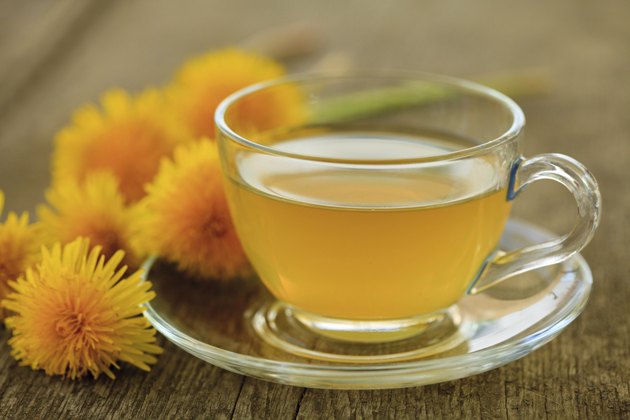
佛r centuries, herbal teas have been used for their medicinal properties. Traditionally made by pouring boiling water over a plant's leaves, roots, seeds or bark, herbal teas are not the same as black or green tea -- which both come from a specific plant species known as Camellia sinensis. Herbal teas can be made from a wide variety of plants, with an array of touted health benefits linked to the specific herb used in the tea. Some herbal teas, such as dandelion, horsetail, nettle and parsley, are known to rid the body of excess fluids through urination, similar to the actions of diuretics or water pills.
Dandelion Tea
An article published in the August 2015 issue of "Integrative and Comparative Biology" reported that 85 species of plants are known to have diuretic activity. Consequently, several herbal teas are considered to possess diuretic effects. Dandelion tea is one such tea, with a long history of use for treating liver, gallbladder and digestive problems, and for its use as a diuretic. In a small study published in the August 2009 issue of "Journal of Alternative and Complementary Medicine," researchers gave volunteers dandelion leaf extract and measured the amount of urine excreted after consumption. All 17 volunteers had an increase in urination within 5 hours of consuming the extract. As with most herbal products, more research is needed to understand the effectiveness of dandelion tea, including dosing and safety issues.
Horsetail Tea
Horsetail, a nonflowering weed closely related to the fern, is an herb that has been used as medicine since ancient times, and also traditionally used as a diuretic. A March 2014 report published in "Evidence-Based Complementary and Alternative Medicine" examined urine volume in 36 healthy male volunteers after providing alternating treatments of Equisetum arvense, or horsetail extract, a placebo, and hydrochlorothiazide -- a common diuretic. Researchers concluded the horsetail extract was as effective as hydrochlorothiazide. Study authors propose that many of this plant's compounds are linked to a mild diuretic action, however since this study used horsetail extract, not tea, the effective dose of horsetail tea is not known.
Stinging Nettle and Parsley Tea
Stinging nettle, also known as Urtica dioica, has been used as a medicinal herb since the medieval period in Europe, where it was used as a diuretic. In a rat study published in the November 2000 issue of "Journal of Ethnopharmacology," researchers confirmed a diuretic effect of this herb, but also suggested high doses can have adverse effects. Parsley is another herb used in tea and touted to have a diuretic effect. A rat study published in the March 2002 issue of "Journal of Ethnopharmacology" confirmed a significant increase in urine output when rats were given parsley seed extract. Additional herbal teas are also claimed to have diuretic effects, although in many cases, there is limited or no human research on the effectiveness and safety these herbs.
Black and Green Tea
Unlike herbal teas, which are typically caffeine free, black and green tea naturally contain caffeine. A commonly held belief is that caffeine-containing beverages are dehydrating, or have a diuretic-like effect. However, this conclusion stems from research in which large doses of caffeine were given at once, with caffeine levels much higher than the natural amounts found in tea. A review published in the July 2006 "European Journal of Clinical Nutrition" concluded caffeine consumption from tea will not cause a diuretic-like effect unless the amount consumed in one sitting was more than 300 mg of caffeine -- the amount in 6 to 7 cups of tea.
Warnings
In most people, a cup of herbal tea -- even if it is considered a mild diuretic -- will not have any adverse effects. However, prescription diuretics are commonly used to rid the body of excess fluids in order to treat conditions such as congestive heart failure, high blood pressure and some types of kidney and liver disease. In these cases, the effectiveness and safety of the diuretic drug is of critical importance, and it is not recommended to use herbal therapies as a substitute. Herbal therapies are not regulated the same as drugs, and in most cases, little is known about drug interactions or adverse effects. Excess fluid loss from diuretics can risk dehydration and electrolyte imbalance, which can be life threatening. If you have fluid retention and wish to consider using an herbal tea to treat this condition, speak to your doctor first about risks and benefits.
Reviewed by Kay Peck, MPH RD
Is This an Emergency?
- European Journal of Clinical Nutrition: Black Tea – Helpful or Harmful? A Review of the Evidence
- Indian Journal of Research in Pharmacy and Biotechnology: Hypertension and Herbal Plant for its Treatment: A Review
- Integrative and Comparative Biology: Plant Secondary Compounds as Diuretics: An Overlooked Consequence
- Journal of Alternative and Complementary Health: The Diuretic Effect in Human Subjects of an Extract of Taraxacum Officinale Folium Over a Single Day
- Pharmacognosy Review: Role of Natural Herbs in the Treatment of Hypertension
- National Institutes of Health: National Center for Integrative and Complementary Medicine: Dandelion
- Journal of Ethnopharmacology: Acute Diuretic, Natriuretic and Hypotensive Effects of a Continuous Perfusion of Aqueous Extract of Urtica Dioica in the Rat
- Evidence-Based Complementary and Alternative Medicine: Randomized, Double-Blind Clinical Trial to Assess the Acute Diuretic Effect of Equisetum arvense (Field Horsetail) in Healthy Volunteers
- Journal of Ethnopharmacology: Diuretic Effect and Mechanism of Action of Parsley.
- American Botanical Council: Herbal Medicine: Stinging Nettle Herb and Leaf